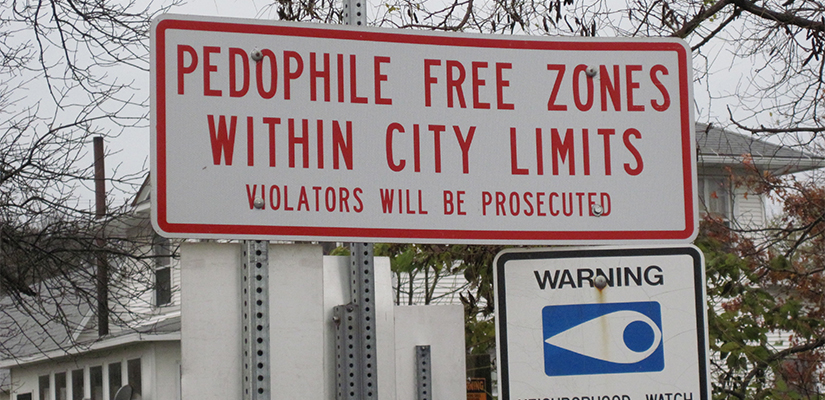A lawyer from Santa Maria is on a mission to curb restrictive laws passed in California communities affecting the daily lives of registered sex offenders that she says violate the California and U.S. Constitutions.
Janice Bellucci, a civil rights attorney and president of California Reform Sex Offender Laws (California RSOL), has filed complaints in the Central and Eastern U.S. District Courts of California challenging restrictions enacted in the cities of Pomona and South Lake Tahoe, respectively.
According to attorney Bellucci, the ordinances currently in effect in these cities violate state and federal constitutional rights of citizens required to register under the California Sex Offender Registration Act (Penal Code Section 290) because they prohibit where law-abiding citizens may lawfully reside and/or physically be present.
Additionally, she argues, the restrictions in place in Pomona and South Lake Tahoe are preempted by existing state law and are thus invalid.
She states that additional legal challenges await other California cities with similar restrictions.
California Court of Appeals Strikes Down Sex Offender Ordinances in Orange County
Recently, our attorneys at Wallin & Klarich reported that on January 10, 2014, the California Court of Appeals, 4th District ruled that ordinances passed in the City of Irvine and the County of Orange prohibiting sex offenders from certain public places were invalid because they were preempted by state law.
In the City of Irvine case, the Court held that “the state statutory scheme imposing restrictions on a sex offender’s daily life fully occupies the field and therefore preempts the city’s efforts to restrict sex offenders from visiting city parks and recreational facilities.” [People v. Nguyen, 222 Cal. App. 4th 1168 (Cal. App. 4th Dist. 2014)]
A similar decision was reached in a related case affecting a countywide ordinance banning sex offenders in public places in Orange County [People v. Godinez, Case No. G047657, Cal. Court of Appeals, January 10, 2014 (unpublished)]
These ordinances had intended to prohibit registered sex offenders from entering areas defined by those ordinances as places frequented by children and included parks, harbors, beaches, zoos and other recreational facilities deemed to be places where “children regularly gather.”
The Court also found that requiring sex offenders to obtain written permission from local authorities prior to entering parks and other recreational facilities amounted to a “de facto registration requirement” and was likewise preempted by state law.
What Does Preempt Mean?
In the present context, preemption is a doctrine of state law that holds that a state law takes precedence over a local law or regulation that is in the same field and is in conflict or inconsistent with the state law.
Article XI, Section 7 of the California Constitution authorizes the following: “A county or city may make and enforce within its limits all local, police, sanitary, and other ordinances and regulations not in conflict with general laws.”
According to the lawsuits filed by attorney Bellucci, the California Legislature has already enacted a full complement of state laws prohibiting unlawful sexual activity and regulating the conduct of sex offenders. Therefore, she argues, the local laws conflict with state law and are void.
The recent decisions in the California appellate court upheld the state’s authority to preempt, or supersede local regulation of where a sex offender may be present.
The matter of whether it is constitutional to restrict where a sex offender may live is currently under review by the California Supreme Court.
Municipalities Were Served Notice
After the Court of Appeals rendered its rulings regarding Irvine and Orange County, California RSOL sent letters to 71 California municipalities with similar ordinances to notify them of the appellate court decisions. The organization headed by Ms. Bellucci requested that the cities repeal their ordinances within 60 days or face a possible legal challenge.
According to the California RSOL website (www.californiarsol.org), Costa Mesa and El Centro have repealed their ordinances. Other cities, including Anaheim, Grand Terrace, Loma Linda and South Pasadena have all agreed to suspend enforcement pending a decision by the California Supreme Court on whether it will grant or deny review of the lower court’s decisions.
“Future legal challenges by sex offenders can be expected of cities that have failed to either repeal their sex offender ordinances or agree in writing to stay enforcement of those ordinances,” Bellucci has stated in a press release.
Ms. Bellucci’s office confirmed that previous lawsuits she has prepared against the cities of Lancaster, Palmdale, Sierra Madre and the County of El Dorado (where South Lake Tahoe is located) have all resulted in either repeal or a stay of enforcement of similar ordinances enacted in those municipalities.
What Do Laws Prohibit Sex Offenders from Doing?
Currently, California law under Penal Code Section 3003.5 makes it unlawful for anyone required to register pursuant to Section 290 to reside within 2000 feet of a public or private school, or park where children regularly gather. However, the law does not permit local governments from restricting where a sex offender may be physically present.
Additionally, California Penal Code Section 3053.8 prohibits a sex offender on parole for an offense committed against one or more child victims under the age of 14 from entering a park without his or her parole agent’s prior permission.
Other state laws restrict sex offenders from being on the grounds of a secondary (K-12) school absent written permission from the school’s chief administrator, and regulate a sex offender working or volunteering in a position where the registrant would have direct supervision or access to children on a regular basis (Penal Code Section 290.95).
Generally, city and county sex offender ordinances go beyond state law by imposing additional restrictions as follows:
- Residency restrictions: Limit where and with whom a sex registrant may live, in addition to prohibiting them from living within 2000 feet (or more) of schools, parks and/or many other locations;
- Presence restrictions: Prohibit sex registrants from loitering and/or being within certain distances (300 feet or more) of certain public facilities and private business; and
- Halloween restrictions: Forbid sex registrants from decorating their homes, leaving on their porch lights and passing out candy on October 31st each year.
According to the lawsuit filed against Pomona, a sex offender may not live within ½ mile (2640 feet), nor come within 100 yards (300 feet) of places not only where children frequent such as schools, day care centers and arcades; but also public parks, bus stops and rail stations, and private businesses including ice rinks, movie theaters, museums, golf courses, and health clubs (that provide child care).
South Lake Tahoe’s ordinance is less restrictive, but similarly limits both residency and presence.
What Does Wallin & Klarich Think?
No one would ever suggest that protecting children is a bad idea. We all want our children to be safe in the communities they live and play in. Exiling sex offenders from society may sound like the best way to protect families, but sometimes laws get passed with good intentions that have unintended consequences, or violate the rights of others. 
In reality, there is no evidence that residency and presence restrictions against this unpopular minority makes anyone safer. On the contrary, evidence shows that continued ostracization leads to social instability, homelessness, unemployment and ultimately to greater susceptibility that a sex offender registrant will re-offend. This is completely counterproductive to public safety.
The ordinances being challenged by attorney Janice Bellucci may indeed violate the federal constitutional rights of law-abiding citizens who are required by state law to register as sex offenders.
It seems clear that some of the restrictions she is challenging are preempted by existing California law and therefore void under Article XI, Section 7 of the California Constitution. The California Court of Appeals has already ruled so on similar matters in two previous decisions.
We support Ms. Bellucci’s efforts to protect the constitutional rights of the people of the United States. Justice for all is what makes this a free country and it is the duty of attorneys throughout the country to ensure that justice.



